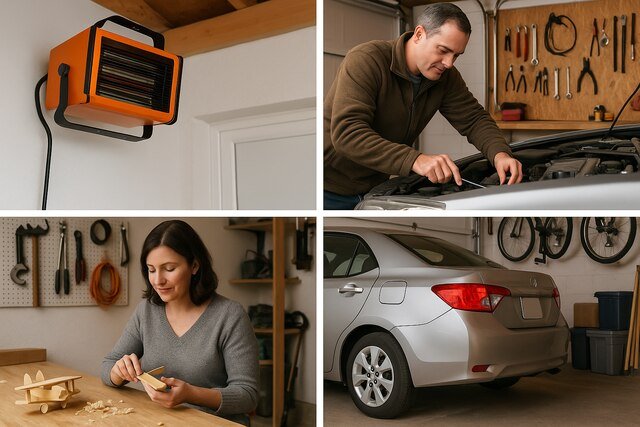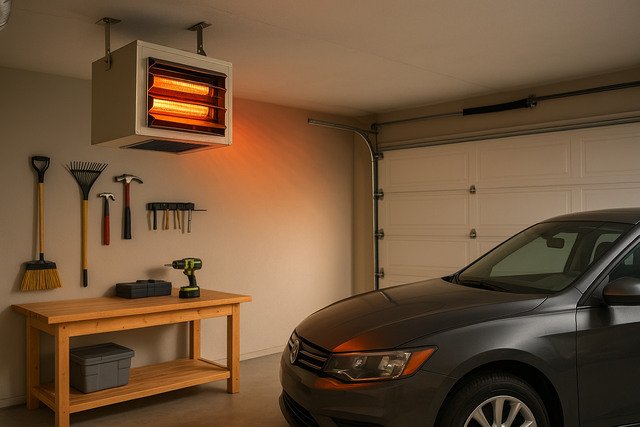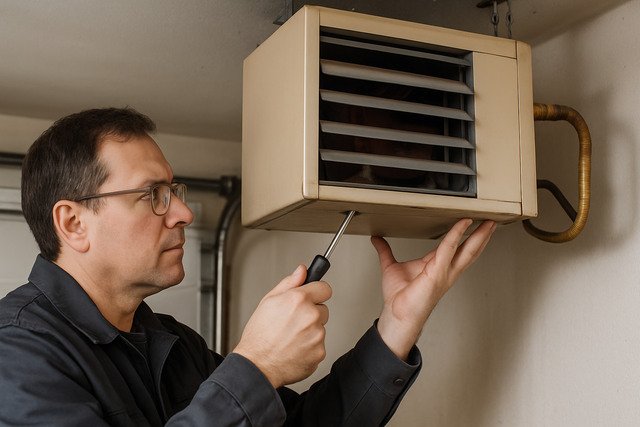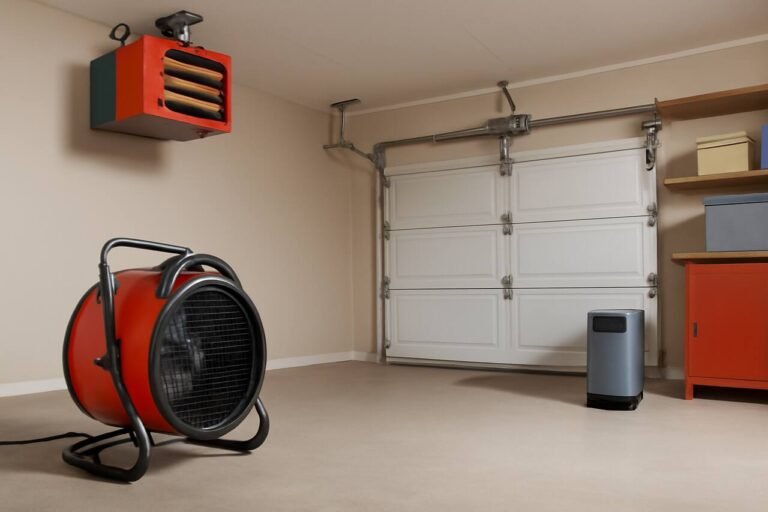A garage heater is an excellent solution for turning your garage into a usable space year-round, especially during the colder months. Whether you’re using your garage as a workshop, a home gym, or just a storage area, having the right heater can make a big difference. In this comprehensive guide, we’ll explore the different types of garage heaters, their benefits, installation considerations, and tips for maintaining your unit. We’ll also help you make an informed decision on the best garage heater for your needs.
Types of Garage Heaters
When it comes to garage heaters, you have several options, each offering different heating methods and efficiency levels. The two most common types are electric and gas-powered heaters, but each comes with its own set of features that may be better suited to specific needs. Choosing the right type of heater depends largely on your garage’s size, how often you use it, and your budget.
Electric heaters are typically easy to install and are a great option for smaller garages. They don’t require any venting, which means installation is hassle-free. Electric heaters can be either mounted on the wall or ceiling, or they may be portable units that you can move around as needed. They’re perfect for those who need quick, localized heat without the need for a gas connection. However, they can be more expensive to operate over time, particularly in larger spaces or areas with colder climates.
Gas-powered heaters, on the other hand, are more powerful and are better suited for larger garages or for individuals who spend a lot of time working in their space. They provide faster and more efficient heat but require proper installation, including a gas line connection and ventilation to exhaust gases like carbon monoxide. Gas heaters can be more economical in the long run because they are generally cheaper to operate than electric models, especially for heating larger areas or for extended use.
Electric Garage Heaters
Electric heaters are among the most popular choices for homeowners. They are easy to install, require no venting, and are generally safe to use. These heaters are ideal for smaller garages or for those who don’t want to deal with gas connections. Many electric models come with adjustable thermostats, allowing you to control the temperature to suit your comfort level.
Gas-Powered Garage Heaters
Gas-powered heaters are more powerful and efficient for larger garage spaces. They typically require a connection to either natural gas or propane. These heaters tend to heat up the space quickly and are ideal for people who use their garage as a workshop or spend a lot of time in the space. However, gas heaters do require proper ventilation to ensure safety, as they produce carbon monoxide.
Benefits of Using a Garage Heater

The advantages of installing a garage heater go far beyond just keeping you warm in the winter. From enhancing comfort to protecting your belongings, a garage heater is a smart investment that brings practical benefits throughout the year. Below are the key reasons why having a garage heater can be invaluable.
The first and most obvious benefit is improved comfort. A garage heater creates a cozy environment that allows you to work, exercise, or even relax in your garage, even during the coldest months. Without a heater, a garage can become too cold to comfortably use, making tasks like working on a car or doing DIY projects nearly impossible. With a garage heater, you can enjoy year-round use of the space, no matter the temperature outside.
Another benefit is the protection it offers to vehicles, tools, and other equipment. Cold temperatures can cause damage to vehicles, especially the engine and fluids, leading to costly repairs. Similarly, tools, paint, and other equipment may become brittle or fail to function properly in extreme cold. A heater helps maintain a stable temperature, preventing damage caused by freezing conditions and ensuring your equipment is always ready to use.
Improved Comfort
A garage heater makes it possible to work in your garage throughout the year, even during the coldest months. This is especially beneficial if you use your garage as a workspace, as the cold can make it difficult to concentrate or work effectively. A heater ensures that you can stay warm and comfortable no matter the weather outside.
Protection for Vehicles and Tools
Cold temperatures can cause damage to vehicles and tools over time. Metal parts can contract, and fluids may freeze, which could lead to costly repairs. A garage heater maintains a consistent temperature, preventing the cold from affecting your car and equipment. This also helps in maintaining the overall condition of your garage.
How to Choose the Right Garage Heater

Selecting the right garage heater depends on several factors, including your garage’s size, your heating needs, and how often you plan to use it. There are many different models and brands available, each offering varying degrees of efficiency, ease of installation, and functionality. Here are some things to consider when making your decision.
The size of your garage is one of the most important factors to consider. Larger garages will need a more powerful heater to ensure the space heats evenly. If you have a small or medium-sized garage, a less powerful unit may be sufficient. Check the manufacturer’s recommended heating capacity based on square footage and insulation to ensure that the heater you choose is adequate for the space. For larger garages, you may need a gas-powered heater or a more powerful electric model.
The type of heating system you choose will depend on your specific needs and preferences. If you’re looking for a hassle-free solution with no venting required, an electric heater may be the best choice. Electric heaters are easy to install and operate, especially for those who only need to heat the space occasionally. Gas heaters, however, offer higher heating efficiency and are typically better for those who use their garages more regularly. Consider the long-term costs and benefits of each type to determine which is best for your situation.
Size of the Garage
One of the most important factors when choosing a heater is the size of your garage. Larger garages will require a more powerful heater to ensure that the space is evenly heated. A smaller garage, on the other hand, can benefit from a smaller, less powerful unit. Consider the square footage of your garage and check the heater’s specifications to find a model that can handle that size.
Type of Heating System
Decide whether you prefer an electric heater or a gas-powered one. Electric heaters are generally easier to install and maintain, while gas heaters can provide more heat and efficiency for larger spaces. The type of heating system you choose will depend on your needs, how often you use the garage, and your personal preference for energy sources.
Installation Considerations for Garage Heaters
Proper installation is essential to ensure your garage heater operates safely and efficiently. While some models can be installed by homeowners, others may require professional installation, particularly gas-powered heaters. Here are some things to keep in mind when installing a garage heater.
If you choose an electric heater, installation is typically straightforward. Many models are plug-in units that require no professional assistance. However, if you’re opting for a more powerful system that needs to be hardwired into your electrical system, it’s a good idea to hire a licensed electrician. For gas-powered heaters, installation is more complex and involves connecting the heater to a gas line, ensuring proper ventilation, and following all safety guidelines. It’s highly recommended to hire a professional to install a gas heater to avoid potential hazards.
In addition to installation, the location of the heater is crucial for optimal performance. Placing the heater in a central area of the garage can help ensure that the entire space is heated evenly. If your heater is wall-mounted or ceiling-mounted, avoid placing it near flammable materials or objects that could obstruct airflow. For portable units, make sure to position them where the warm air can circulate freely throughout the space without blocking any exit or ventilation points.
Location of the Heater
Where you place your heater is important for efficient heating. Typically, heaters should be placed in a central location to ensure even heat distribution. If you opt for a wall-mounted or ceiling-mounted heater, make sure it’s positioned in a way that allows for maximum airflow and doesn’t obstruct any areas of the garage.
Ventilation Requirements
If you choose a gas-powered heater, proper ventilation is a must. These heaters produce carbon monoxide as a byproduct, which can be dangerous if not properly vented outside. Make sure the heater you choose has the necessary venting systems and that your garage has proper ventilation to safely handle the exhaust gases.
Garage Heater Safety Tips
Safety is always a priority when using any type of heater in your garage. Since garages can often contain flammable materials and other hazards, it’s essential to follow specific safety protocols to reduce the risk of accidents. Below are a few key safety tips to follow.
Ensure that you keep flammable materials, such as gasoline, paints, and chemicals, away from the heater. These substances are highly combustible and can easily catch fire if exposed to heat or sparks. Always store these materials in a safe, designated area away from the heater, and never leave them near the heater when it is in use. Also, avoid placing any objects on top of or around the heater, as this can block airflow and increase the risk of overheating.
For gas-powered heaters, it’s crucial to install carbon monoxide detectors in your garage. Carbon monoxide is an odorless, colorless gas that can be deadly if inhaled in high concentrations. If you’re using a gas-powered unit, ensure that your garage is properly ventilated to allow exhaust gases to escape. Check your heater regularly for gas leaks and signs of wear to ensure safe operation. Regular maintenance will also help ensure that your heater is functioning properly and not posing any safety risks.
Keep Flammable Materials Away
Make sure to keep any flammable materials, such as gasoline, paint, or solvents, away from the heater. These materials can catch fire if they come into contact with heat or sparks. Always store these materials in appropriate containers and in a safe location away from your heater.
Install Carbon Monoxide Detectors
If you use a gas-powered heater, it’s important to install carbon monoxide detectors in your garage. Carbon monoxide is a colorless, odorless gas that can be deadly in high concentrations. A detector will alert you if levels rise too high, giving you time to ventilate the area or turn off the heater.
Maintaining Your Garage Heater

To ensure that your garage heater continues to operate efficiently and safely, regular maintenance is essential. Depending on the type of heater, maintenance requirements can vary, but all heaters benefit from routine care. Here’s how to maintain your garage heater for long-lasting performance.
For electric heaters, one of the most important maintenance tasks is cleaning. Dust and debris can accumulate inside the unit and affect its performance. Make sure to clean the heater regularly by removing dust with a soft cloth or a vacuum cleaner. Check the unit for any blockages or signs of damage, and ensure that the wiring and controls are in good condition.
If you have a gas-powered heater, maintenance is slightly more involved. You should check for gas leaks, inspect the burner and gas lines for any signs of wear, and ensure that the ventilation system is clear of obstructions. It’s also a good idea to check the exhaust vent regularly to ensure that it is functioning correctly. If you’re unsure about performing maintenance tasks, consider hiring a professional technician to inspect and service your gas heater annually.
Clean the Heater Regularly
Dust and dirt can accumulate inside the heater, reducing its efficiency. Regular cleaning is essential to maintain proper airflow and prevent overheating. Check the manufacturer’s instructions for cleaning guidelines, and make sure to remove any buildup that could affect performance.
Check for Gas Leaks (For Gas Heaters)
If you use a gas-powered heater, it’s crucial to check for gas leaks regularly. Gas leaks can be dangerous and lead to potential fires or health hazards. Inspect the gas line, connections, and the heater itself for any signs of leakage. If you detect a leak, turn off the gas supply immediately and contact a professional.
Conclusion
Investing in a garage heater can make your garage a more comfortable and practical space, no matter the weather. From small electric models to large gas-powered units, there are plenty of options to choose from, each suited to different needs and budgets. By understanding the different types of heaters, their benefits, and how to maintain them, you can ensure that your garage stays warm and functional for years to come.
FAQ’s
The cost of running a garage heater depends on the type of heater, the size of your garage, and how often you use it. Electric heaters tend to be more expensive to operate over time, especially in larger spaces, while gas heaters are more efficient for heating larger areas and can be more economical in the long run.
While some electric garage heaters are easy to install on your own, gas-powered models typically require professional installation. A licensed professional will ensure the heater is installed safely, connected to a gas line, and properly vented to avoid any potential hazards.
Regular home heaters are generally not designed for garage use. Most home heaters lack the necessary safety features and are not built to handle the space and conditions in a garage. It’s always better to use a heater specifically designed for garage spaces, whether it’s electric or gas-powered.
It is generally not recommended to leave any heater on overnight unless it is specifically designed to run continuously. Always check the manufacturer’s guidelines for safe operation. If you must leave a heater on, ensure it is a model with an automatic shutoff or timer feature for safety.
The lifespan of a garage heater depends on its type and how well it is maintained. Electric heaters typically last 10-15 years, while gas-powered models may last up to 20 years or more with proper care. Regular maintenance, such as cleaning and inspections, can help extend the life of your heater.

